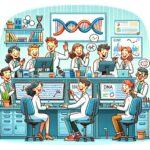
A Guide to Transitioning Careers
December 27, 2024Breaking Into Sales with a Bioinformatics Background: A Guide to Transitioning Careers
Bioinformatics is an exciting and dynamic field, but for some professionals, the stress, workload, or desire for a new challenge leads them to explore alternative career paths. One increasingly popular option is transitioning into sales, particularly in the biotechnology and sequencing industries. But how can someone with a bioinformatics background break into this field, especially without prior sales experience or a Ph.D.? This blog explores strategies, recent trends, and practical tips to help you navigate this career shift.
Why Sales in Biotechnology?
Sales roles in biotech and sequencing companies, such as Illumina or Nanopore, often require deep technical knowledge to effectively communicate the value of complex products to customers. This makes bioinformaticians well-suited for such roles, as they bring a strong understanding of sequencing technologies and data analysis. Additionally, sales roles offer opportunities for higher salaries, performance-based incentives, and the chance to work closely with diverse teams and customers.
Challenges and Misconceptions
- High Competition: Field Application Scientist (FAS) and related roles are highly competitive. Many positions favor candidates with Ph.Ds. or prior sales experience.
- Sales Experience Gap: Employers often prioritize candidates with proven sales records, even over technical expertise.
- Market Saturation: With layoffs in the biotech sector, the job market is currently more employer-driven, increasing competition.
Practical Strategies for Breaking In
- Highlight Transferable Skills:
- Focus your resume on customer-facing experiences, presentations, and problem-solving skills.
- Emphasize your ability to explain technical concepts to non-experts—a key skill in sales.
- Broaden Your Application Pool:
- Look beyond big names like Illumina and apply to smaller biotech firms or startups where competition may be less fierce.
- Target roles like “Scientific Support Specialist” or “Customer Success Manager” as stepping stones to sales.
- Networking Is Key:
- Use LinkedIn to connect with hiring managers and industry professionals. Ask for feedback and advice.
- Attend biotech conferences or events to build connections and learn about potential opportunities.
- Practice Sales Scenarios:
- Tailor Your Applications:
- Customize your CV and cover letter for each position. Highlight your technical expertise and its relevance to sales.
- If possible, include examples of how you’ve successfully collaborated with teams or supported customers.
Alternatives to Sales Roles
If sales isn’t a perfect fit, consider adjacent roles such as:
- Technical Support: Assist customers in troubleshooting and optimizing the use of biotech products.
- Project Management: Oversee projects that connect R&D, marketing, and customer needs.
- Online Teaching: Leverage your bioinformatics expertise to teach online courses, which can be both fulfilling and lucrative.
Current Trends and Insights
- Ph.D. Advantage: While not mandatory for all sales roles, a Ph.D. can make a candidate more competitive. However, many companies also value real-world technical experience and communication skills.
- Diverse Pathways: Many professionals transition into sales after gaining experience in technical support or customer success roles, demonstrating that sales experience isn’t the only entry point.
- Market Realities: In today’s job market, persistence and adaptability are crucial. Rejection doesn’t mean failure—it’s an opportunity to refine your approach.
Final Thoughts
Transitioning from bioinformatics to sales is challenging but achievable. It requires a strategic approach, leveraging your technical background, honing your soft skills, and being open to alternative pathways. While the journey may seem daunting, the rewards—both financial and personal—can be well worth the effort.
If you’re considering this shift, start small, network widely, and don’t hesitate to ask for feedback. The biotech industry thrives on innovation and adaptability—qualities that every bioinformatician already possesses.
Good luck on your career journey!
Keywords for SEO: bioinformatics career transition, bioinformatics to sales, biotech sales roles, sequencing companies jobs, scientific support specialist jobs, transitioning careers biotech, bioinformatics job market trends
















